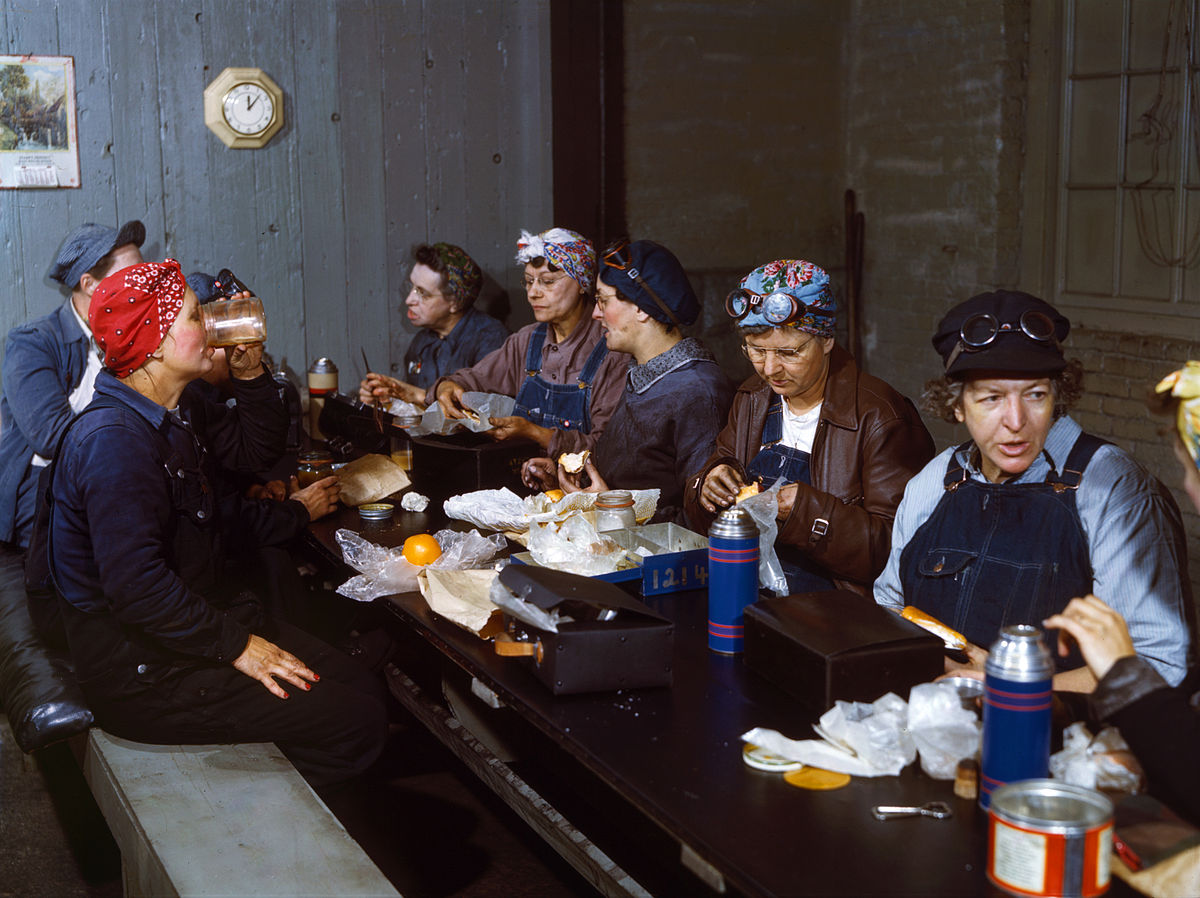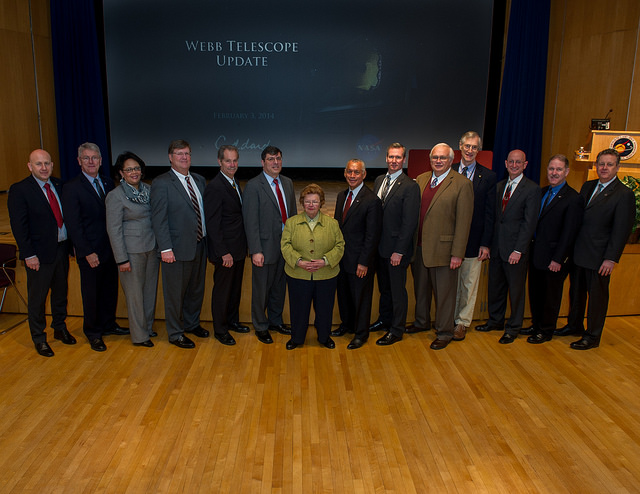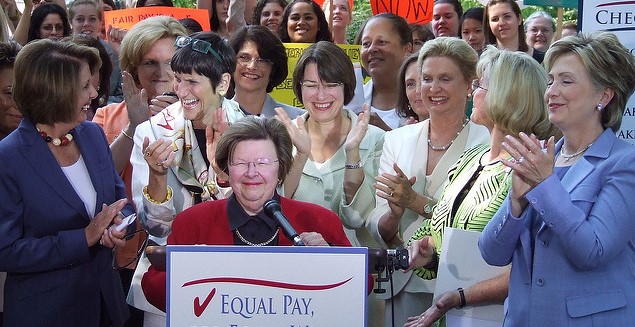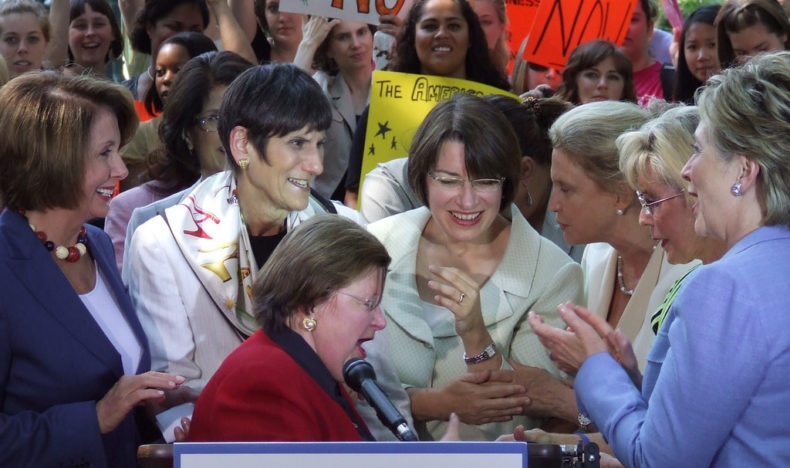I’ve been interviewing women scientists again, younger ones this time. I ask them if they have some kind of semi-official, almost casual way of staying connected with other women scientists. Because, you know, staying connected helps you survive the bullshit. Every time I ask them this question — and the answer is almost always “YES!” — I think of Senator Barbara Mikulski’s lunches which were surely a bullshit-survival mechanism. But they were something more: they were also watched. What happens when a network of women is watched? This first ran January 9, 2017.
I wish I could remember – but I can’t – the woman who told me a story about how she and other women in her profession had regular lunches, casually, unofficially, no agenda. Was she a lawyer? A writer? An astronomer? Just don’t remember. The thing I’m sure about is that the point was not that the women met for lunch, it was that the men they worked with noticed that they met. The men didn’t get snippy, didn’t make comments, just noticed: something like, “saw that you were at one of your lunches.”
Now there’s a thought. I’ve spent a certain amount of my career writing about women in science and the gender-related issues they deal with, including how to get attention paid to their research, how to get taken seriously, and how to get enough power. Why even be in a profession unless your voice gets heard and you can do things that you’re good at, things worth doing, the things worth your time on earth? Even the paleolithics wanted to have the things they made (I stole this idea from Jacob Bronowski, around minute 14:45), show the shapes of their hands.
And of course women have always and still have trouble being noticed. One work-around was hilarious: a woman in a meeting says something (“Let’s check the immigrant statistics”), another woman in the meeting repeats it and cites the first woman (“I think we should do what Sarah suggested, check the immigrant statistics”). They called it “amplification,” as in, boosting the signal, making it louder, spreading it farther, just like a cell phone tower. Parts of these last two paragraphs are digressions.
The solution of the woman-I-can’t-remember was different from amplification, less in-your-face: it was just, have lunch. When I was in academia, I was part of something like this. A friend in another department, agreeing with everybody that the university’s percentage of women faculty (upper-body strength not a requisite) was pathetic, began reserving a lunch table at the faculty club every few weeks. She thought that since we were so few, we might like to know each other. There we sat, at an obviously-reserved table, in the middle of the faculty club dining room, talking not about university politics or the plight of women or the subversion of the patriarchy, just talking to the person across the table about what her research was finding these days or had she travelled somewhere interesting over the summer or how were her classes going. I loved these lunches; they made me feel more a part of the university’s intellectual candy store. But that was the view from the inside. I never thought about the old boys at the next table over, what they might be seeing. Though I do remember the same comment, something like, “saw you at one of your lunches.”
Turns out Senator Barbara Mikulski had the same idea. After she announced her retirement, the news media talked all about how she was head of the enormously powerful Appropriations Committee, and how she was 4’ 11” and stood on a stool so she could be seen over a podium, and how she’d been in the Senate for 30 years and was the longest-serving woman senator and when she first got there, she was only the second senator to be a woman and the Senate didn’t have women’s bathrooms and she was supposed to wear skirts.
And in almost all of those news reports was this same piece of information: that every month or so for two decades, Mikulski had held – often at her house – famously private dinners to which only women senators were invited, no men. Because women senators come in all political persuasions, the discussions were not business meetings, they were just people getting to know each other, listening, talking – you know, the basis on which the human, social world of politics begins its arguments, negotiations, and compromises.
Some news reports said that the dinners were the reason that women senators got an unrepresentative amount of stuff done.
But again, that’s the view from the inside. Here’s my point: the dinners were private –the rule was no staff, no memos, no leaks — and even then, they were a standard part of the public news reports. The dinners existed and so the guys watched, they noticed. Maybe humans can’t help ourselves, when some people sit around in a special group, we pay attention, we wonder what they’re up to. And even if they seem to be up to nothing special, just sitting around eating, we notice. We keep an eye on them, see if they do it again. They do. They do it for the next twenty years. They’re a presence now.
All the gender-related inequities still have to be talked about, written about, legislated, enacted, enforced. But meanwhile, damn, sisters: to be seen, start with lunch.
__________
Roundhouse Wipers, 1943 – United States Library of Congress’s Prints and Photographs division, via Wikimedia Commons
Senator Barbara Mikulski (guess which one she is) and NASA (part of her professional purview) staff, via Flickr
Mikulski and fellow senators at the 2008 Leadership Conference on Civil Rights, the National Women’s Law Center, and the National Partnership for Women and Families: Clarissa Peterson, LCCR, via Flickr




It’s the little things that make an impact, isn’t it?
Years ago I was taken along to an otherwise all-women’s dinner at the AGU annual meeting. I was the token male, an accident of chance. We were all students nearing our defense dates. I’d been hanging out during the afternoon poster session with some of my cohort chatting with them about their research. (I found my own too boring to talk about and am insatiably curious about the creativity of other scientists.) The women began to assemble and talk about the venue for the evening. I’m not sure if they took me along because they were too polite to exclude me or because I was too dense to take the hints (Were there hints? There may have been hints. I don’t really understand humans very well. I didn’t used to think that about myself but my friends tell me it’s true. People just know those sorts of things about each other, I guess. Weird. Are people always watching each other? I digress.)
The evening was delightful. The conversation engaging and far ranging. And … I was sworn to secrecy. I thought that a bit funny at the time. But over the next few days I discovered why. I was asked repeatedly by other men what the women had talked about. Fascinating. They had been watching. Did they feel threatened? Curious? Who knows. But, wow, what an effect a simple dinner had. Like ripples in a pond.
Oh I LOVE this story, Dr. D.! May I share it on Twitter? good conversations get started that way.
And yes, people are always watching each other. I think it’s the main thing people do, watch each other. Not that I feel watched myself because I think of myself as invisible. I’ll bet that’s generally the case, that people watch other people but think they themselves are invisible.
Share away! And I’m pretty sure I *am* invisible… 😀